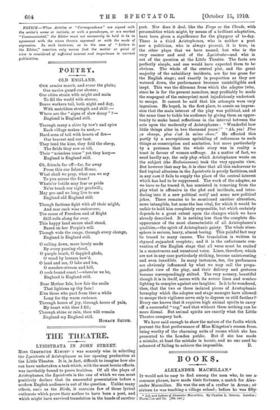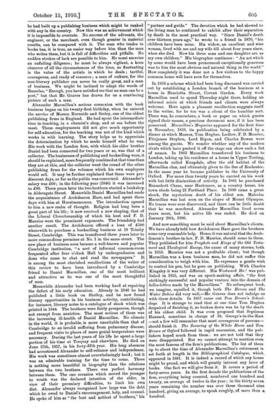BOOKS.
ALEXANDER MACMILLAN.*
Fr would not be easy to find among the men who, to use a• common phrase, have made their fortunes, a match for Alex- ander Macmillan. He was the son of a crofter in Arran; at sixteen he was teaching a village school ; before he was fifty, • Infe and Letters of Alexander Macmillan. By Charles L. Graves. London Macnt=an and Co. [10s. net.]
he had built up a publishing business which might be ranked with any in the country. Now this was an achievement which it is impossible to overrate. No success of the advocate, the engineer, or the merchant, even though greater in material results, can be compared with it. The man who trades in books has, it is true, an easier way before him than the man who writes them, but it is full of difficulties and pitfalls. No sudden strokes of luck are possible to him. He mast exercise an unfailing diligence ; he must be always vigilant, a keen observer of all the circumstances of the time, so fluctuating is the value of the article in which he deals ; tactful, courageous, and ready of resource ; a man of culture, for the non-literary publisher can never be really great, and a man of business. We might be inclined to adapt the words of Rasselas, "Enough, you have satisfied me that no man can be a poet," but that Mr. Graves has drawn for us a convincing picture of such a man.
Alexander Macmillan's serious connexion with the book business began on his twenty-first birthday, when he entered the service of Messrs. Burnside and Seeley, one of the oldest publishing firms in England. He had spent the intermediate time in teaching, in a chemist's shop, and at sea before the mast. These employments did not give much opportunity for self-education, for the teaching was not of the kind which works in with learning. The story helps us to appreciate the determination by which he made himself what he was. His work with the London firm, with which his elder brother Daniel had been connected for two years or so, was that of a collector. The businesses of publishing and bookselling were, it should be explained, more frequently combined at that time than they are at this, and the collector went the round of the other publishing firms for the volumes which his own employers would sell. It may be further explained that these were pre- discount days, as far as the public was concerned. Alexander's salary was £60; in the following year (1840) it was increased to 280. Three years later the two brothers started a bookshop in Aldersgate Street. Meanwhile Daniel Macmillan had made the acquaintance of Archdeacon Hare, and had spent three days with him at Hurstmonceaux. The introduction opened to bins a new realm of thought. Religion had long been a great part of his life ; it now received a new shaping, that of the Liberal Churchmanship of which his host and F. D. Maurice were the prominent exponents. The friendship had another result. The Archdeacon offered a loan of 2500 wherewith to purchase a bookselling business at 19 Trinity Street, Cambridge. This was transferred three years later to more commodious premises at No. 1 in the same street. The new place of business soon became a well-known and popular Cambridge institution, "a sort of informal common-room frequented after four o'clock Hall by undergraduates and dons who came to chat and read the newspapers." It is among the most cherished recollections of the writer of this review to have been introduced by a Cambridge friend to Daniel Macmillan, one of the most brilliant and attractive as he was one of the most thoughtful of men.
Meanwhile Alexander had been working hard at repairing the defect of his early education. Already in 1840 he had published a little book on Shelley, and he now found literary opportunities in his business activity, contributing, for instance, literary notes to a catalogue of stock which was printed in 1844. The brothers were fairly prosperous, though not exempt from anxieties. The most serious of these was the increasing ill-health of Daniel Macmillan. No climate in the world, it is probable, is more unsuitable than that of Cambridge to an invalid suffering from pulmonary disease, and frequent visits to places of more genial temperature were necessary. During the last years of his life he spent a large portion of his time at Torquay and elsewhere. He died on June 27th, 1857, in his forty-fifth year. His long absences had accustomed Alexander to self-reliance and independence. His work was sometimes almost overwhelmingly hard ; but it was an admirable training for the time to come. There is nothing more beautiful in biography than the relations between the two brothers. There was perfect harmony between them. The one occasion which moved the younger to wrath was the declared intention of the elder, in view of their pecuniary difficulties, to limit his own diet. Alexander always recognised how large was the debt which he owed to Daniel's encouragement, help, and counsel. )1e spoke of him as "the best and noblest of brothers," his "partner and guide." The devotion which he had showed to the living man he continued to exhibit after their separation by death in the most practical way. "Since Daniel's death over thirteen years ago," he wrote to a friend in 1870, "his children have been mine. His widow, an excellent and wise woman, lived with me and my wife till about four years since, when she died. Now his three sons and one daughter are as my own children." His biographer continues : "An act which by some would have been pronounced exceptionally generous was to him the most obvious and natural thing in the world." How completely it was done not a few visitors to the happy common home will have seen for themselves.
In 1858 a scheme which had been long discussed was carried out by establishing a London branch of the business at a house in Henrietta Street, Covent Garden. Every week Macmillan used to spend Thursday night there, holding an informal soiree at which friends and clients were always welcome. Here again a pleasant recollection suggests itself to the writer, for he too was a client of the humbler sort. There was, he remembers, a book or paper on which guests signed their names, a precious document now, if it has been preserved. Macmillan's Magazine appeared for the first time in November, 1859, its publication being celebrated by a dinner at which Masson, Tom Hughes, Ludlow, F. D. Maurice, Fitzjames Stephen, Lord Ripon, and Charles Bowen were among the guests. We wonder whether any of the modern rivals which have pushed it off the stage can show such a list of names. In 1863 Macmillan transferred his business to London, taking up his residence at a house in Upper Tooting, afterwards called Knapdale, after the old habitat of the Macmillan clan, and ultimately given to the See of Rochester. In the same year he became publisher to the University of Oxford. For more than twenty years he carried on his work with but little diminution of activity. In 1885 he purchased Bramshott Chase, near Haslemere, as a country house, his town abode being 21 Portland Place. In 1889 came a great shock, the mysterious death of his eldest son. Malcolm Macmillan was last seen on the slopes of Mount Olympus. No traces were ever discovered, and there can be little doubt that he was murdered. Alexander Macmillan lived seven years more, but his active life was ended. He died on January 28th, 1896.
And now something must be said about Macmillan's clients. We have already told how Archdeacon Hare gave the brothers some very seasonable help. Hence it was natural that the Arch- deacon's brother-in-law, F. D. Maurice, should come to them. They published for him Prophets and Kings of the Old Testa- ment and Theological Essays, the cause of many storms, both in 1853. Maurice was not a profitable client; but though Macmillan was a keen business man, he did not suffer this consideration to weigh with him. He expresses a gentle wish to control his pen, but be goes on publishing. With Charles Kingsley it was very different. His Westward Ho! was pub- lished in 1855, and was an epoch-making affair, "the first strikingly successful and popular venture into the domain of belles-lettres made by the Macmillans." No subsequent book, we imagine, equalled it, though both The Heroes and The Water Babies did very well,—Mr. Graves does not indulge us with these details. In 1857 came out Tom. Brown's School- days. It is strange to read that at one time Tom Hughes despaired of finishing it, so broken down was he by the death of his eldest child. It was even proposed that Septimus Hansard, sometime in charge of St. George's-in-the-East —not a few will remember that most courageous of parsons— should finish it. The Scouring of the White Horse and Tons Brown at Oxford followed in rapid succession, and the pub- lishers hoped much from them : we are not told that they were disappointed. But we cannot attempt to mention even the most famous of the firm's publications. The list of them up to about the time of Alexander Macmillan's retirement is set forth at length in the Bibliographical Catalogue, which. appeared in 1891. It is indeed a record of which any house might be proud, and which will greatly interest any lover of books. One fact we will give from it. It covers a period of forty-seven years. In the first decade the publications of the firm, everything being counted, numbered one hundred and twenty, an average of twelve in the year ; in the thirty-seven years remaining the number was over three thousand nine hundred, giving an average, to speak roughly, Of more than hundred.















































 Previous page
Previous page